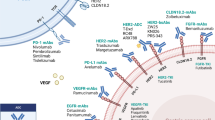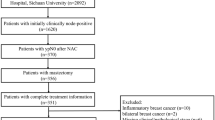Abstract
Background
Intensive trimodality therapy is needed for locally advanced esophageal squamous cell carcinoma (ESCC). However, some patients develop recurrence and die of cancer even after trimodality therapy.
Methods
We evaluated prognostic factors based on data from 125 patients with ESCC who underwent neoadjuvant chemoradiotherapy (NCRT) comprising concurrent chemotherapy and 40 Gy of radiation, followed by curative-intent esophagectomy.
Results
Thirty-four (27.2%) patients achieved a pathological complete response (pCR) after NCRT. The 5-year recurrence-free (RFS) and overall survival (OS) rates of all patients were 49.2 and 52.9%, respectively, and were significantly better for patients with pCR than without pCR (p = 0.01 and 0.02, respectively). Univariate and multivariate analyses selected performance status [PS 0 vs. 1: hazard ratio (HR) 2.05; 95% confidence interval (CI) 1.30–4.84; p = 0.01] and ypN (0 vs. 1: HR 2.33; 95% CI 1.12–4.84; p = 0.02; 0 vs. 2/3: HR 3.73; 95% CI 1.68–8.28; p = 0.001) as independent covariates for RFS. Furthermore, PS (0 vs. 1; HR 2.94; 95% CI 1.51–5.72; p = 0.002) and ypN (0 vs. 1; HR 2.26; 95% CI 1.09–4.69; p = 0.03; 0 vs. 2/3: HR 3.90; 95% CI 1.79–8.48; p = 0.001) were also independent covariates for OS.
Conclusions
Performance status 1 and ypN+ were significantly associated with a poor prognosis after trimodality therapy for ESCC.


Similar content being viewed by others
References
Sjoquist KM, Burmeister BH, Smithers BM, Australasian Gastro-Intestinal Trials Group et al (2011) Survival after neoadjuvant chemotherapy or chemoradiotherapy for resectable oesophageal carcinoma: an updated meta-analysis. Lancet Oncol 12:681–692
van Hagen P, Hulshof MC, van Lanschot JJ et al (2012) Preoperative chemoradiotherapy for esophageal or junctional cancer. N Engl J Med 366:2074–2084
Tepper J, Krasna MJ, Niedzwiecki D et al (2008) Phase III trial of trimodality therapy with cisplatin, fluorouracil, radiotherapy, and surgery compared with surgery alone for esophageal cancer: CALGB 9781. J Clin Oncol 26:1086–1092
Hamai Y, Hihara J, Emi M et al (2015) Results of neoadjuvant chemoradiotherapy with docetaxel and 5-fluorouracil followed by esophagectomy to treat locally advanced esophageal cancer. Ann Thorac Surg 99:1887–1893
Wood MD, Zaki BI, Gordon SR et al (2013) Trimodality therapy for stage II–III carcinoma of the esophagus: a dose-ranging study of concurrent capecitabine, docetaxel, and thoracic radiotherapy. J Thorac Oncol 8:487–494
Berger AC, Farma J, Scott WJ et al (2005) Complete response to neoadjuvant chemoradiotherapy in esophageal carcinoma is associated with significantly improved survival. J Clin Oncol 23:4330–4337
Alnaji RM, Du W, Gabriel E et al (2016) Pathologic complete response is an independent predictor of improved survival following neoadjuvant chemoradiation for esophageal adenocarcinoma. J Gastrointest Surg 20:1541–1546
Hamai Y, Hihara J, Emi M et al (2016) Ability of fluorine-18 fluorodeoxyglucose positron emission tomography to predict outcomes of neoadjuvant chemoradiotherapy followed by surgical treatment for esophageal squamous cell carcinoma. Ann Thorac Surg 102:1132–1139
Hamai Y, Hihara J, Taomoto J et al (2014) Hemoglobin level influences tumor response and survival after neoadjuvant chemoradiotherapy for esophageal squamous cell carcinoma. World J Surg 38:2046–2051. doi:10.1007/s00268-014-2486-2
Shapiro J, Biermann K, van Klaveren D et al (2017) Prognostic value of pretreatment pathological tumor extent in patients treated with neoadjuvant chemoradiotherapy plus surgery for esophageal or junctional cancer. Ann Surg 265:356–362
Wen J, Luo K, Liu H et al (2016) MiRNA expression analysis of pretreatment biopsies predicts the pathological response of esophageal squamous cell carcinomas to neoadjuvant chemoradiotherapy. Ann Surg 263:942–948
Wen J, Yang H, Liu MZ et al (2014) Gene expression analysis of pretreatment biopsies predicts the pathological response of esophageal squamous cell carcinomas to neo-chemoradiotherapy. Ann Oncol 25:1769–1774
Arnold M, Soerjomataram I, Ferlay J et al (2015) Global incidence of oesophageal cancer by histological subtype in 2012. Gut 64:381–387
Agrawal N, Jiao Y, Bettegowda C et al (2012) Comparative genomic analysis of esophageal adenocarcinoma and squamous cell carcinoma. Cancer Discov 2:899–905
Ohashi S, Miyamoto S, Kikuchi O et al (2015) Recent advances from basic and clinical studies of esophageal squamous cell carcinoma. Gastroenterology 149:1700–1715
Koshy M, Greenwald BD, Hausner P et al (2011) Outcomes after trimodality therapy for esophageal cancer: the impact of histology on failure patterns. Am J Clin Oncol 34:259–264
Oken MM, Creech RH, Tormey DC et al (1982) Toxicity and response criteria of the Eastern Cooperative Oncology Group. Am J Clin Oncol 5:649–655
Sobin LH, Gospodarowicz MK, Wittekind C, International Union against Cancer (2010) TNM classification of malignant tumours, 7th edn. Wiley-Blackwell, Chichester
Hamai Y, Hihara J, Taomoto J et al (2015) Effects of neoadjuvant chemoradiotherapy on postoperative morbidity and mortality associated with esophageal cancer. Dis Esophagus 28:358–364
Emi M, Hihara J, Hamai Y et al (2012) Neoadjuvant chemoradiotherapy with docetaxel, cisplatin, and 5-fluorouracil for esophageal cancer. Cancer Chemother Pharmacol 69:1499–1505
Miyata H, Yamasaki M, Takiguchi S et al (2010) Pre- and post-therapy nodal status equally affects survival of patients with oesophageal squamous cell carcinoma receiving preoperative chemoradiation. Oncol Rep 23:1331–1337
Akutsu Y, Shuto K, Kono T et al (2012) The number of pathologic lymph nodes involved is still a significant prognostic factor even after neoadjuvant chemoradiotherapy in esophageal squamous cell carcinoma. J Surg Oncol 105:756–760
Chao YK, Chen HS, Wang BY et al (2016) Prognosis of patients with pathologic T0N+ esophageal squamous cell carcinoma after chemoradiotherapy and surgical resection: results from a nationwide study. Ann Thorac Surg 101:1897–1902
Jung HA, Adenis A, Lee J et al (2013) Nomogram to predict treatment outcome of fluoropyrimidine/platinum-based chemotherapy in metastatic esophageal squamous cell carcinoma. Cancer Res Treat 45:285–294
Clavier JB, Antoni D, Atlani D et al (2014) Baseline nutritional status is prognostic factor after definitive radiochemotherapy for esophageal cancer. Dis Esophagus 27:560–567
Siersema PD, van Hillegersberg R (2008) Treatment of locally advanced esophageal cancer with surgery and chemoradiation. Curr Opin Gastroenterol 24:535–540
Stiles BM, Salzler GG, Nasar A et al (2015) Clinical predictors of early cancer-related mortality following neoadjuvant therapy and oesophagectomy. Eur J Cardiothorac Surg 48:455–460
Brescia AA, Broderick SR, Crabtree TD et al (2016) Adjuvant therapy for positive nodes after induction therapy and resection of esophageal cancer. Ann Thorac Surg 101:200–208
Hsu HY, Chao YK, Hsieh CH et al (2016) Postoperative adjuvant therapy improves survival in pathologic nonresponders after neoadjuvant chemoradiation for esophageal squamous cell carcinoma: a propensity-matched analysis. Ann Thorac Surg 102:1687–1693
Author information
Authors and Affiliations
Corresponding author
Ethics declarations
Conflict of interest
The authors have no commercial support or conflicts of interest to disclose.
Rights and permissions
About this article
Cite this article
Hamai, Y., Hihara, J., Emi, M. et al. Evaluation of Prognostic Factors for Esophageal Squamous Cell Carcinoma Treated with Neoadjuvant Chemoradiotherapy Followed by Surgery. World J Surg 42, 1496–1505 (2018). https://doi.org/10.1007/s00268-017-4283-1
Published:
Issue Date:
DOI: https://doi.org/10.1007/s00268-017-4283-1




